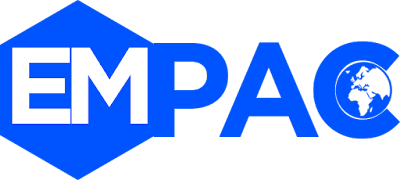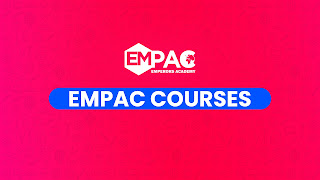CLICK HERE AND APPLY FOR ADMISSION
Word processing is no longer just a skill; it's an essential tool in the modern digital age. Whether you're a student, a professional, or someone looking to upskill, proficiency in word processing can dramatically amplify your efficiency and presentation abilities. At Empac, we've crafted an exceptional Word Processing course that caters to all—from absolute beginners to advanced users. Here's a glimpse into what awaits you.
Why Word Processing is
Essential
In the
digital age, everything is documented. From business proposals and academic
research papers to personal blogs and creative writing—every text starts its
journey in a word processing software. Having a command over these tools not
only ensures your content looks professional but also saves you a considerable
amount of time and effort.
Why Choose Empac's Word
Processing Course
1.
Holistic Approach: Our course isn't just
about teaching you a software. It's about making you adept at crafting,
editing, and presenting written content in the best possible manner.
2.
Expert Instructors: Learn from the best in the
industry. Our instructors bring a wealth of experience and are always updated
with the latest in word processing technologies and techniques.
3.
Hands-on Learning: At Empac, we believe in
learning by doing. Our course is packed with real-world projects and tasks,
ensuring you apply what you learn, as you learn.
4.
Flexible Learning: Whether you prefer
face-to-face sessions or virtual classes, we've got you covered. Plus, our
learning modules are available 24/7, letting you learn at your own pace.
5.
Certification of
Excellence: On
completing the course, you'll be awarded Empac's Word Processing
certification—a testament to your expertise and a significant boost to your
professional credentials.
Who Should Enroll
Our course
is designed for:
- Beginners: If you're new to the world of digital
documentation, we'll take you from zero to hero.
- Professionals: Enhance your CV, impress your
colleagues, and bring efficiency to your work.
- Students: Submit assignments that stand out not just in
content but also in presentation.
- Creative Writers: Learn how to format
your work for publications or personal portfolios.
Conclusion
Choosing
to elevate your word processing skills with Empac's course is choosing to stay
ahead in the digital age. Be it for professional growth, academic prowess, or
personal development—our course promises to deliver and then some. Ready to
transform your textual expertise? Join us at Empac, where excellence meets
education.
CLICK HERE AND APPLY FOR ADMISSION
Word Processing Course
Curriculum
Beginner Level
1.
Introduction to
Word Processing
·
Definition and Importance
·
Overview of Popular Word Processing Software
2.
Getting Started
with Word Processing
·
Launching the Program
·
Exploring the Interface and Ribbon
·
Creating, Saving, and Opening Documents
3.
Basic Document
Formatting
·
Text Formatting (Bold, Italics, Underline)
·
Changing Fonts and Font Sizes
·
Text Alignment (Left, Center, Right, Justify)
4.
Paragraph
Formatting
·
Line Spacing (Single, 1.5, Double)
·
Bullet Points and Numbering
·
Indents and Tabs
5.
Inserting Basic
Elements
·
Pictures and Clip Arts
·
Tables
·
Hyperlinks
6.
Basic Page Setup
and Printing
·
Setting Margins
·
Choosing Paper Size
·
Print Preview and Printing
Intermediate Level
7.
Advanced Document
Formatting
·
Styles and Themes
·
Headers and Footers
·
Page Numbers and Page Breaks
8.
Advanced Table
Manipulation
·
Merging and Splitting Cells
·
Table Styles
·
Sorting Data in Tables
9.
Working with
Graphics
·
Resizing and Cropping Images
·
Text Wrapping Around Graphics
·
Using Drawing Tools
10.
Document Reviewing
Tools
- Spell Check and Grammar
Check
- Using Thesaurus
- Track Changes and
Comments
11.
Inserting Advanced
Elements
- Charts and Graphs
- SmartArt Graphics
- Footnotes and Endnotes
12.
Collaboration Tools
- Sharing Documents
- Working with Multiple
Document Versions
- Co-authoring a Document
Advanced Level
13.
Advanced Document
Layout
- Columns and Text Boxes
- Creating a Table of
Contents
- Indexing
14.
Mail Merge
- Understanding Mail
Merge Concepts
- Setting up the Main
Document
- Linking to Data Sources
- Completing the Merge
15.
Macros and
Automation
- Recording Macros
- Editing Macros with VBA
(Very Basic Introduction)
- Assigning Macros to
Buttons or Keys
16.
Templates and Forms
- Using and Customizing
Built-in Templates
- Creating Custom
Templates
- Designing Forms
17.
Protecting and
Securing Documents
- Password Protection
- Restricting Editing
- Digital Signatures
18.
Integration with
Other Applications
- Embedding Objects from
Other Programs
- Linking Data from
External Sources
- Importing and Exporting
Data
19.
Optimizing Long
Documents
- Using Master Documents
- Cross-referencing
- Inserting Bibliographies and Citations






0 Comments